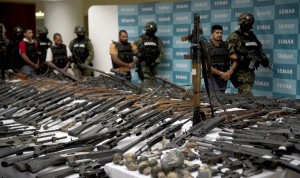
Former Cops: The Drug Cartels are Winning
Stephen C. Webster
"[Look] at Phoenix, Arizona," Neill Franklin, a former undercover police officer in Maryland, told Raw Story recently. "That is the number two kidnapping capital in the world. A couple years back they were averaging one drug-related kidnapping every day. We do already have these [cartels] in the United States, but you just don't hear about them very often. And when we do, it's not the 'undocumented workers' as people are often led to believe, it's the result of our drug policies."
Suggesting Phoenix has the second most number of kidnappings out of any city in the world is not new: for instance, that very claim was immediately disputed after Sen. John McCain said it in 2010. However, a review of kidnapping statistics by a team of judges and criminologists earlier this year nearly doubled the official 2008 numbers, lending at least some credibility to the statement.
No matter what statistic it is that's examined, be it the kidnapping ranking of Phoenix, shootings in El Paso, marijuana arrests in Brownsville or the number of new gang members in San Diego, the reality of today's America is that drug violence has become a pervasive and pressing threat to most citizens.
"We have got to fix this problem, or else it's going to get a lot worse for us here at home," explained Terry Nelson, whose three-decades in law enforcement saw him serving the U.S. Border Patrol, the Department of Homeland Security and the U.S. Customs Service. "We talk a lot about the 40,000 people who've died in the last five years in Mexico's drug war, but we don't talk a lot about Central and South America. The drug deaths down there per 100,000 are just as great as Mexico. Guatemala, El Salvador ... These countries are just wiped out by drug cartels, and it's not even in the news."
Just last week, people on both sides of the border were shocked when authorities discovered a chilling scene where two bodies were hanging from a bridge, mutilated beyond recognition, next to a handwritten poster warning to avoid publishing about the cartels on social media or blogs. The situation has become so extreme that today more Mexican youths die from murder than vehicle accidents.
But what does this mean for American citizens? In short: the drug cartels have won, but it doesn't have to be this way.
Both Nelson and Franklin are members of the non-profit advocacy group Law Enforcement Against Prohibition, which aims to win the hearts and minds of law enforcement and conservative lawmakers, who've largely stood in the way of any significant changes to the nation's drug policies.
Franklin, LEAP's director whose time as an undercover officer came amid the height of the cocaine craze in the 1980s, explained that what used to be a large bust to him -- a kilo or two of cocaine -- is now little more than a few handfuls of powder. "They're bringing it in with giant shipping containers now," he said. "Boats. 18-wheelers. Submarines even."
"These are businessmen," Nelson said. "These are people who own shopping malls and service businesses. By all appearances, these appear to be legitimate businessmen. Their money is in the banks. Law enforcement and busts have just become the cost of doing business for them. There's really no stopping them anymore."
Nelson also said that even in Colombia, where U.S. authorities have spent billions strengthening the Colombian military, going so far as to send U.S. troops and drone aircraft to patrol for smugglers, it has not deterred the cocaine producers, and the costs to the U.S. taxpayer have skyrocketed, to little effect.
Both men agreed that the dramatic escalation in the sheer volume of drug shipments is indicative of a growing business savvy among the cartels, which the Department of Justice says are now the major distributors of illicit substances in every large U.S. population center.
"As you're trying to find out who all these people are in these networks, we felt like we were being effective in interrupting the drug supply," Franklin said. "But a significant seizure today is a container-load, we're talking tons of cocaine, tons of heroin. And when we intercept those today, the streets don't even hiccup. The availability doesn't change. The cartels build their losses into what they ship. They know, percentage-wise, how much to write off."
For any business that exists outside the law, the consequences for mistakes are much greater than in the private sector: and for the lower-level cartel members, or their opponents, that consequence is often death.
"The worst thing I saw quite often in South America is people being stuffed into barrels and soaked with diesel fuel, then set on fire," Nelson said. "That's got to be the worst kind of death, even worse than all the beheading we've seen in Mexico lately."
"We still have violence associated to the cartels in our country," Franklin added. "Most of it is probably on members of the cartels themselves. When their workers don't do what they're supposed to do, they suffer the consequences."
Nelson, a life-long Republican, said that he believes many conservative lawmakers are beginning to come around to their view of drug policy as counter-productive to the overall goals of the drug war. "They're just waiting for when it becomes politically viable to take action," he said. "I hope that happens. It needs to."
"If you legalize it, you take the violence and the obscene profits out of [drugs]," he added. "Legalization does not help your drug problem, it helps your crime problem. Over the years in this war, we've made no progress. Legalization, education and treatment is the best way."
Image: Guns seized from a Mexican cartel. Credit: AFP.
Sept. 16, 2011
http://www.rawstory.com/rs/2011/09/16/former-cops-the-drug-cartels-are-winning/

 Tags:
Tags: